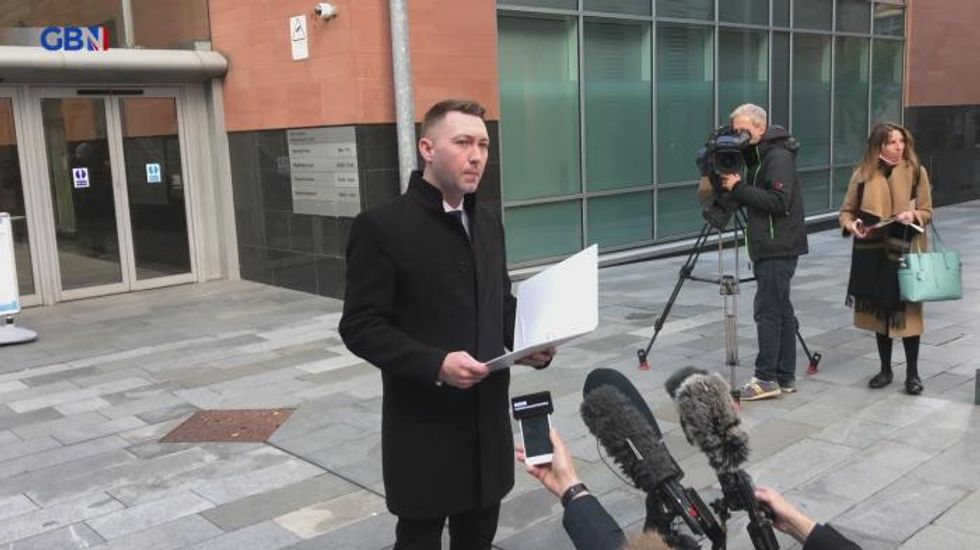Manchester Arena bomber gave imam a 'hateful look' after he denounced extremism, inquiry told
Imam, Mohammed Saeed El-Saeiti, tells inquiry he could see from suicide bomber Salman Abedi's face 'he was not happy with me'
Don't Miss
Most Read
Manchester Arena suicide bomber Salman Abedi gave a “hateful look” to an imam after he gave a mosque sermon which denounced extremism, an inquiry has heard.
Mohammed Saeed El-Saeiti said he received online death threats following his speech at Didsbury Mosque on the day so-called Islamic State revealed it murdered Manchester taxi driver Alan Henning in October 2014.
An “inciteful” Facebook message by Abedi’s father, Ramadan, was also posted in which he urged worshippers to “isolate this man” to avoid the mosque being closed by the UK Government.
The inquiry into the May 2017 terror attack that killed 22 people and injured hundreds was told the sermon also prompted a petition calling for his dismissal, with signatories including Abedi’s brothers Hashem and Ismail.
Giving evidence on Wednesday, Mr El-Saeiti said mosque trustees admonished him for talking about politics and warned him threats had been made to harm him if he returned to the pulpit.
He said: “I was speaking about the sanctity of human life. So I didn’t mention political groups. I’m not affiliated with any political party, I was just basically combatting terrorism and extremism.”
He said he named IS, al-Qaeda and also Libyan-based Islamist militia groups Ansar al-Sharia and the Shura Council of Benghazi Revolutionaries, who he referred to as “dogs of hellfire”.
At the end of the sermon a man snatched the microphone and accused him of espousing political views, he said.
Mr El-Saeiti said: “This man was a cardiologist. I told him he should feel ashamed to defend Isis. I did tell him in front of the congregation.”
Weeks later Salman and Hashem Abedi were sat “very close” to the pulpit and he could see from Salman’s face “he was not happy with me”, he added.
Mr El-Saeiti said: “One of the congregation told me he sent his children to sit behind them in case ‘they might do something to you’.”
Shortly after he had a second encounter with Salman in a corridor at the mosque, the inquiry heard.
The witness said: “He gave me a hateful look. He showed me that he didn’t like me, basically.”
He said he went on to phone Ramadan Abedi because he believed his Facebook post had incited harm against him.
Mr El-Saeiti said: “He said to me ‘you spoke about the brothers of Ansar al-Sharia’. He said ‘I know them, they are good people’. So I then told them they are terrorists, they behead, they kill.”
Ansar al-Sharia was a banned terror group in the United States at the time of his sermon in October 2014, and the organisation was proscribed in the UK a month later.
Libyan-born Mr El-Saeiti said, as far as he knew, the majority of Libyans who attended the mosque, also known as the Manchester Islamic Centre, were anti-Colonel Gaddafi, the late deposed leader.
He said sympathisers of terrorist groups in Benghazi were among the congregation.
“Some of them signed the petition,” he said, adding: “They objected to my sermon against those groups.”
He told the inquiry he raised concerns about regular “secret meetings” of Libyans supporting such extreme organisations held at the mosque throughout 2015 and 2016, which he said were sanctioned by trustees.
Mosque chairman Fawzi Haffar has denied any such meetings took place and labelled Mr El-Saeiti “a liar” who he said held a grudge after he was made redundant.
Mr Haffar said Didsbury Mosque was “middle of the road, mainstream” and rejected any suggestion it was not doing enough to address whether members of its congregation were being radicalised.
The inquiry has heard Ismail Abedi, 28, helped in classes at Didsbury Mosque with Koran reading in Arabic between February 2014 and July 2017, while during that time in possession of “significant” IS-mindset material on his electronic devices. In August, Ismail was allowed to leave the UK – to the “horror” of bereaved families – a month after he was summonsed to give evidence to the inquiry.
Ramadan Abedi regularly performed the call to prayer at the mosque because of his “pleasant voice” and his wife, Samia Tabbel, worked as a teacher there, the inquiry has heard. Both are currently in Libya and remain suspects in the bombing.











